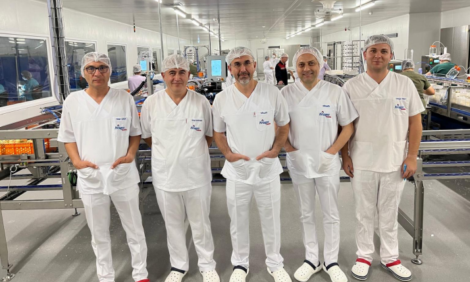



Will the term organic still mean anything when it's adopted whole hog by Supermarket behemoths?
US - Marin Sun Farms, in Point Reyes, is a collection of ranches on more than 2,000 acres of rolling, certified organic pasture. All year long, cattle and chickens speckle the hills, free to roam and graze at their leisure.
The Hereford and Angus cows, in fact, are never confined. They are grass-fed, except during winter, when they also eat hay and silage. The chickens' typical diet of plants and insects is supplemented with organic grains, which they eat at night, in the winter and in otherwise foul weather when kept in their portable coops. When you imagine an organic cattle ranch, Marin Sun Farms is probably pretty close to what you picture -- though maybe not exactly.
No synthetic fertilizers or chemical pesticides are used on the pasture, and the animals are hormone- and antibiotic-free. But even though most of the land is certified organic, the cows and chickens raised there are not.
One reason is because the owner, David Evans, obtains cows from partner ranchers who use synthetic "wormers" to control parasites -- a violation of organic standards. But Evans has been slowly accumulating a base herd with an eye toward becoming entirely organic.
Lately, however, Evans has begun to wonder if the USDA "Certified Organic" stamp will be worth the annual fee, which could run more than $1,000. His pastures -- the largest certified organic acreage in Marin County -- may seem large, but they are dwarfed by their corporate counterparts.
As Evans knows, organic food has become big business. According to the Organic Consumer's Association, sales could hit $18 billion this year, with half coming from conventional supermarkets. Though still only about 2.5 percent of the agricultural market, demand for organic has grown 20 percent annually in recent years, and most of the top-selling brands are now owned by agribusiness behemoths.
Source: San Francisco Chronicle
No synthetic fertilizers or chemical pesticides are used on the pasture, and the animals are hormone- and antibiotic-free. But even though most of the land is certified organic, the cows and chickens raised there are not.
One reason is because the owner, David Evans, obtains cows from partner ranchers who use synthetic "wormers" to control parasites -- a violation of organic standards. But Evans has been slowly accumulating a base herd with an eye toward becoming entirely organic.
Lately, however, Evans has begun to wonder if the USDA "Certified Organic" stamp will be worth the annual fee, which could run more than $1,000. His pastures -- the largest certified organic acreage in Marin County -- may seem large, but they are dwarfed by their corporate counterparts.
As Evans knows, organic food has become big business. According to the Organic Consumer's Association, sales could hit $18 billion this year, with half coming from conventional supermarkets. Though still only about 2.5 percent of the agricultural market, demand for organic has grown 20 percent annually in recent years, and most of the top-selling brands are now owned by agribusiness behemoths.
Source: San Francisco Chronicle









